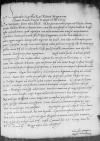 BCz, 1601, p. 279
BCz, 1601, p. 279
⌊Sigismundus⌋ Dei gratia rex Poloniae, magnus dux Lituaniae, Russiae, Prussiae, Masoviae etc dominus et heres
Ad haec, quae nunc nobis scripserunt illustres domini comites palatini Rheni et Bavariae duces, iam illis cum assensu et ⌊consilio senatorum Regni nostri⌋ responderamus, quod responsum cum nobis mutare nunc integrum non putavimus, respondimus iterum priore modo illustritatibus suis et rogavimus, ut in hoc tam antiquato et a nemine cognito negotio, deinceps nobis negotium non faciant, nam in hoc nihil amplius praeter primum responsum, in aliis vero amicis officiis omnia polliceri nos posse illis declaravimus, factum tamen Paternitatis Vestrae in retinendo illorum apud se nuntio commendamus, nam id pro nostro commodo illam fecisse plane agnoscimus.
Quod autem ⌊Iacobi⌋ et ⌊Adriani Flinth⌋, consanguineorum Paternitatis Vestrae, causam attinet, nostrum hoc non est, ut illos ⌊civitati⌋ et civitatem illis restituere debeamus, quos non soli nos, sed cum totius ⌊Regni⌋ et ⌊istarum terrarum⌋ ⌊consiliariorum⌋ suasu et assensu proscripsimus et tum etiam nos numquam restituendos verbo nostro recepimus. Quare boni consulat Paternitas Vestra nos hac in re dignitatis et officii nostri rationem habere. Nam idem a nobis pro quibusdam aliis proscriptis petenti illustri domino ⌊duci in Prussia⌋, nepoti nostro carissimo, eadem ratione excusavimus. Ceterum de ⌊Ioanne Holsten⌋, a iudiciis et iurisdictione ⌊civium Gdanensium⌋ exempto, nihil nos adversum iura et privilegia commisisse arbitramur. Nam hoc novum non est neque inusitatum aliquem unum ex certis honestis causis regia auctoritate immunem a iure civitatis facere. Nos autem ipsi ⌊Holste⌋ ad certum tempus eam exemptionem pro sublevanda iustitia sua, quam oppressam adiuravit, concessimus. Cuius revocatio ad omnem occasionem, quae expediret, in nostra semper erit potestate.
⌊⌋, quae nobis misit Paternitas Vestra, cara et grata nobis exstiterunt, his enim legendis et parentum nostrorum iucunda recordatio nobis excitatur, et Paternitatis Vestrae officii diligentis in mentem nobis subit memoria.
Bene et feliciter valeat Vestra Paternitas.


 BCz, 1601, p. 280
BCz, 1601, p. 280